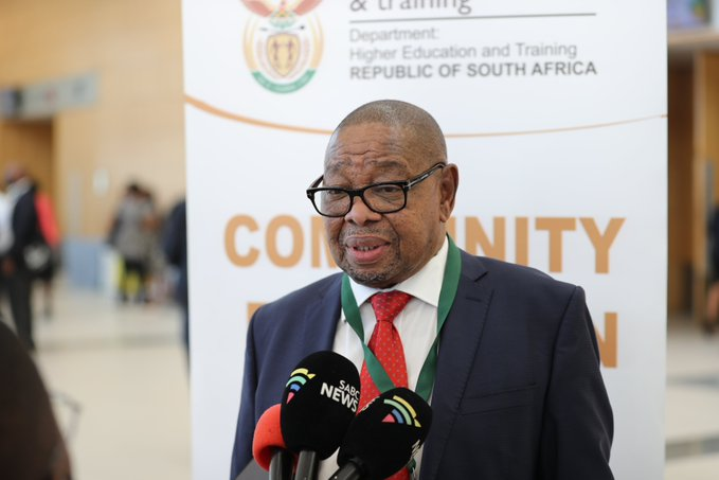Nzimande: Science and Technology Are Social Tools, Not Neutral Instruments
Reflecting on South Africa’s democratic journey, Nzimande highlighted the historical misuse of science under apartheid.

- Country:
- South Africa
Science and technology must be understood as deeply embedded in social relations, rather than as neutral or purely technocratic instruments, says Minister of Science, Technology and Innovation, Professor Blade Nzimande.
The Minister was addressing the Group of 20 (G20) Chief Science Advisors’ Roundtable (CSAR), hosted by the Department of Science, Technology and Innovation’s (DSTI) National Advisory Council on Innovation. The roundtable forms part of South Africa’s extensive G20 science diplomacy agenda, culminating later this month with the G20 Research and Innovation Ministerial Meeting in Pretoria.
Science in the Context of South Africa’s History
Reflecting on South Africa’s democratic journey, Nzimande highlighted the historical misuse of science under apartheid. “After the attainment of democracy in our country, the preoccupation of the democratic state was the reconstruction of our society and more specifically, the building of a society that will be free of the racial, gender, class and spatial injustices of our past,” he said.
He stressed that apartheid systematically deployed science to legitimise racial oppression, reinforcing inequalities that persist to this day. Therefore, in post-apartheid South Africa, the advancement of science cannot be divorced from addressing social justice.
Technology, Ethics, and Global Conflict
Nzimande also drew attention to global conflicts, stating that science and technology are not always used for the advancement of humanity. “The world is witnessing a genocide in Gaza, which is being facilitated by technologies like artificial intelligence,” he remarked, adding that scientific progress must be measured not only by methodological rigour but also by adherence to moral and ethical standards.
He emphasised that governments and scientists must accept that technology is never neutral; it reflects and reproduces power relations. This, he argued, makes ethical frameworks and inclusive policymaking essential.
South Africa’s Commitment to Evidence-Based Policy
The Minister reaffirmed South Africa’s dedication to science-driven public policy and evidence-based governance. The DSTI recently adopted a guiding mantra: “Placing Science, Technology, and Innovation at the Centre of Government, Education, Society, and Industry.”
“The adoption of this mantra reflects our commitment to placing science, technology and innovation at the centre of national development with a view to creating a more inclusive, resilient and sustainable future,” Nzimande explained.
He noted that public trust in science depends on governments embracing science openly and consistently. To this end, the establishment of advisory bodies like the National Advisory Council on Innovation plays a central role.
The G20 CSAR and Global STI Policy
The G20 Chief Science Advisors’ Roundtable was first convened under India’s G20 Presidency in 2023. Its mandate is to strengthen the role of science, technology, and innovation (STI) in shaping both national and international policy.
This year’s CSAR discussions focus on equity-based STI for inclusive human development and global sustainability, aligning with South Africa’s emphasis on social transformation through science.
UNESCO MOST Forum and South Africa’s Leadership
Beyond the G20 agenda, Nzimande is also leading international conversations at the Intergovernmental Council of the Management of Social Transformations (MOST) Forum, hosted at the CSIR International Convention Centre. The MOST Forum is a UNESCO platform for solutions-oriented debate at the intersection of science, policy, and social change.
Nzimande, who currently serves as President of the Intergovernmental Council of the MOST Programme, will chair both the Council meeting and the Forum. These events highlight South Africa’s growing role in shaping global debates on science and social justice.
Looking Ahead: The Tshwane Declaration
The DSTI’s G20 programme will conclude with the G20 Research and Innovation Ministerial Meeting on 23 September 2025 in Pretoria. There, ministers will adopt the Tshwane Declaration (also known as the G20 Research and Innovation Ministerial Declaration).
The declaration is expected to outline commitments to equity-driven innovation, global collaboration in science, and the integration of STI into sustainable development strategies.
A Vision of Inclusive Science
In closing, Nzimande reiterated that South Africa’s vision is to harness science and innovation for transformation, not exclusion. By situating science within the broader context of social justice and ethics, the country hopes to contribute to a model of global cooperation that prioritises human dignity, inclusivity, and sustainability.










